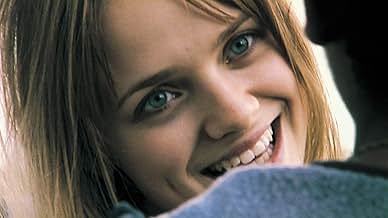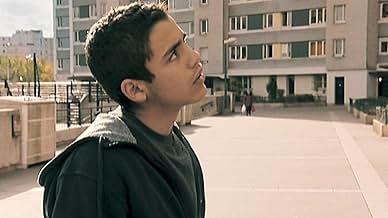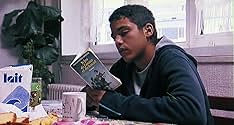IMDb RATING
6.9/10
3.3K
YOUR RATING
Krimo a 15 years old shy boy falls in love for Lídia who is his classmate.To be able to assume his love for her he decides to take a part in the play that was to be one of his friends.Krimo a 15 years old shy boy falls in love for Lídia who is his classmate.To be able to assume his love for her he decides to take a part in the play that was to be one of his friends.Krimo a 15 years old shy boy falls in love for Lídia who is his classmate.To be able to assume his love for her he decides to take a part in the play that was to be one of his friends.
- Awards
- 16 wins & 5 nominations total
Meriem Serbah
- Krimo's Mother
- (as Meryem Serbah)
Featured reviews
This movie is getting fresh exposure in France thanks to its win at Les Césars, or the "French Oscars" as other countries like to call them. Its success will probably mean that it now gets exposure outside the country, too, and I wonder how successfully.
Though an accurate and contemporary examination of France, the film's world is a foreign one, even to many people living here--the specificity of the setting (the projects, in a "suburb" of Paris), the language (rapid-fire, slangy, "vulgar", and peppered with "verlan", a street language of inverted syllables--the word itself could translate as "wardsback", and how anyone will translate this dialogue I have no idea), and the behavior (mostly arguing--strident, pushy, beautifully repetitive) may not play clearly outside of France. I'm not sure how clearly it plays here, or how willing people are to watch it, especially as it turns the idea of the scary bad French projects somewhat on its ear.
This isn't a criticism of the movie; on the contrary. Kechiche has shot a riveting cross-section of teenagers growing up in social housing, in broken homes and poverty, who lack the tools of expression, and who have adopted the posturing of the wounded (and, in the story, almost entirely absent) adults who raise them, attacking (the movie unfolds at a near-constant level of verbal aggression) and dodging ("esquiver" means "to dodge" or "to evade") one another's attacks with all they can muster.
The film's intensely political side feels almost accidental; in its unfolding, it has great heart, and its actors, who are apparently mostly amateurs from around the shooting location, are outstanding. On the whole, it reminded me a great deal of David Gordon Green's George Washington: a simple love story set against a landscape of poverty, played out frankly and honestly, allowed to unfold at a distinctly un-Hollywoodian rhythm. If Green's film is more beautiful cinematic ally, L'Esquive is more concentrated, more unflinching in its examination of the deep repercussions and violence of economic, social, and familial hardship. Its statement that France is no longer a country of the French-of-French-ancestry, and that its refusal to accept its own transformation does not mean its lost generation accepts its loss, could not be more clearly nor more poignantly made.
Without spoiling or going into detail, there are things about the plot that are implausible, things that probably hurt the film overall, but watching this movie for plot is like watching Ocean's Eleven for social insight. This is a positive study of character in a bad situation, of a stratum of society rarely filmed and still more rarely treated as fairly as it is offered up here, beautifully and eloquently.
Though an accurate and contemporary examination of France, the film's world is a foreign one, even to many people living here--the specificity of the setting (the projects, in a "suburb" of Paris), the language (rapid-fire, slangy, "vulgar", and peppered with "verlan", a street language of inverted syllables--the word itself could translate as "wardsback", and how anyone will translate this dialogue I have no idea), and the behavior (mostly arguing--strident, pushy, beautifully repetitive) may not play clearly outside of France. I'm not sure how clearly it plays here, or how willing people are to watch it, especially as it turns the idea of the scary bad French projects somewhat on its ear.
This isn't a criticism of the movie; on the contrary. Kechiche has shot a riveting cross-section of teenagers growing up in social housing, in broken homes and poverty, who lack the tools of expression, and who have adopted the posturing of the wounded (and, in the story, almost entirely absent) adults who raise them, attacking (the movie unfolds at a near-constant level of verbal aggression) and dodging ("esquiver" means "to dodge" or "to evade") one another's attacks with all they can muster.
The film's intensely political side feels almost accidental; in its unfolding, it has great heart, and its actors, who are apparently mostly amateurs from around the shooting location, are outstanding. On the whole, it reminded me a great deal of David Gordon Green's George Washington: a simple love story set against a landscape of poverty, played out frankly and honestly, allowed to unfold at a distinctly un-Hollywoodian rhythm. If Green's film is more beautiful cinematic ally, L'Esquive is more concentrated, more unflinching in its examination of the deep repercussions and violence of economic, social, and familial hardship. Its statement that France is no longer a country of the French-of-French-ancestry, and that its refusal to accept its own transformation does not mean its lost generation accepts its loss, could not be more clearly nor more poignantly made.
Without spoiling or going into detail, there are things about the plot that are implausible, things that probably hurt the film overall, but watching this movie for plot is like watching Ocean's Eleven for social insight. This is a positive study of character in a bad situation, of a stratum of society rarely filmed and still more rarely treated as fairly as it is offered up here, beautifully and eloquently.
10fedka2
This is a dream film, of which I am so entirely thrilled that it received so many awards over the mediocre but over hyped Rois et reine. The self effacement of the director in this film is impeccable, one has the eerie sense of watching a Fred Wiseman documentary. It is true that dialogue can run long and circuitously, but for those with my taste for extreme realism this can only be a downside if the acting is poor, and in l'esquive it is not. The acting is on the contrary frighteningly good, whatever self consciousness the members of this young cast might have before the camera is immediately absorbed in the documentary-like mise en scene, that is to say, it only furthers the sensibilities and aesthetic as a whole. L'esquive is a singular film that we can only hope will influence a generation of young French filmmakers who are tired of the well lit, over produced cinema this country is getting far too comfortable with.
I saw L'Esquive at the San Francisco Film Festival on April 24. I was prepared for a sappy coming-of-age romantic movie but with the first dialogue which whisks you up before even the titles are shown and doesn't put you down until the end of the movie, I got something much more fulfilling. This is one realistic and well-performed movie. The director got some fantastic acting out of an almost 100% amateur cast. Very realistic and fast-paced. It is not a perfect movie, but it is very energetic and definitely a must-see.
Well worth seeing and probably the highlight for me at the festival. Hopefully it will screen in the US.
Well worth seeing and probably the highlight for me at the festival. Hopefully it will screen in the US.
Although imperfect from a cinematographic point of view, this film is remarkable as it penetrates deep into the lives of suburbia kids in Paris.
All kids are from North Africa. They are boeur, which means arab in their bizarre dialect of french. I really doubt an old french man or woman understand what they are saying without subtitles.
To love someone, to leave someone make deep marks in our souls when we are young.
This sincere and honest film about teenage love should not be missed, if there is any screening available.
All kids are from North Africa. They are boeur, which means arab in their bizarre dialect of french. I really doubt an old french man or woman understand what they are saying without subtitles.
To love someone, to leave someone make deep marks in our souls when we are young.
This sincere and honest film about teenage love should not be missed, if there is any screening available.
This French film is a quite disheartening look at life in the public housing projects outside Paris. In a crumbling neighborhood with a majority of immigrants from Northern Africa, a high school tries to produce a play by Pierre Marivaux (1688-1763). The heart of the film is the budding romance between the vivacious blonde Lydia (one of the few "native" French living in the neighborhood) and the shy and painfully inarticulate Krimo, who is ridiculized by his thuggish friends for taking a part in the play. All the kids speak in an unintelligible slang, which makes a contrast with the classical French of Marivaux. I wrote it was disheartening (despite not being a drama) because it shows that the marginalized inhabitants of the projects have an almost nil chance of breaking into the mainstream of French society. Thoughtful and worth seeing.
Did you know
- TriviaThe movie is dedicated Slaheddine.
- ConnectionsReferenced in Leçon de cinéma: Arnaud Desplechin et Mathieu Amalric (2019)
- SoundtracksWarini Werak Tergoud
Performed by Cheba Zahouania
Written and Composed by Cheikha Rimitti
Production: MLP / History
- How long is Games of Love and Chance?Powered by Alexa
Details
- Release date
- Country of origin
- Language
- Also known as
- Votre bouche avec la mienne
- Filming locations
- Saint-Denis, Seine-Saint-Denis, France(Cité des Francs-Moisins: housing complex, Rue du M.al Lyautey: police control)
- Production companies
- See more company credits at IMDbPro
Box office
- Gross US & Canada
- $8,085
- Opening weekend US & Canada
- $2,529
- Sep 4, 2005
- Gross worldwide
- $1,747,263
- Runtime1 hour 57 minutes
- Color
- Sound mix
- Aspect ratio
- 1.85 : 1
Contribute to this page
Suggest an edit or add missing content
























